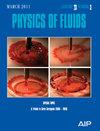双 Y 型通道中双乳液液滴形成的电流体力学研究
IF 4.1
2区 工程技术
Q1 MECHANICS
引用次数: 0
摘要
虽然近年来关于静电场控制下液滴形成的研究越来越多,但关于复合液滴形成与静电场关系的研究却比较零散。为了分析静电场对复合液滴形成的影响,本文对双 Y 型微通道中双乳液的电流体力学进行了数值研究,并对应用的相界面捕捉方法进行了实验验证。利用相场法和静电场耦合模型进行计算,分析了不同电场强度下双乳液的界面演变,并定量研究了液滴形成过程。发现了与以往研究不同的四种流态:滴流态、喷射态、穿流态和喷射-滴流过渡态,其中短喷射态下双乳液液滴的形成频率(f)高达769 Hz。液滴偏心率(ε)最小,ε为 0.2,中间相液滴的变形系数(Defm)最小,为 0.05。可以观察到,在滴流体系中,Cam/Cao 与 CaE 之间呈线性关系,并产生多核双乳液液滴。当 Cam/Cao 大于 14 时,无论 CaE 如何变化,双乳液在通道中的流动机制始终是穿线机制。本文章由计算机程序翻译,如有差异,请以英文原文为准。
Electro-hydrodynamics study of double emulsion droplet formation in a double Y-shaped channel
Although there have been more studies on droplet formation under the control of electrostatic field in recent years, the studies on the relationship between composite droplet formation and electrostatic field are fragmented. In order to analyze the effect of electrostatic field on composite droplet formation, this paper numerically investigates the electro-hydrodynamics of the double emulsion in a double Y-shaped microchannel and experimentally verifies the applied phase interface capture method. Calculations are carried out using a model coupled with the phase field method and electrostatic field to analyze the interfacial evolution of double emulsions under different electric field strengths and to quantitatively study the droplet formation process. Four flow regimes different from previous studies were found: dripping regime, jetting regime, threading regime, and jetting-dripping transition regime, among which the formation frequency ( f ) of double emulsion droplets under the short jetting regime was up to 769 Hz. The eccentricity (ε) of droplets under the dripping regime was the smallest, with ε of 0.2, the coefficient of deformation (Defm) of the middle phase droplets was minimized to 0.05. It is observed that there is a linear relationship between Cam/Cao and CaE in the dripping regime, with the generation of multi-core double emulsion droplets. When Cam/Cao is greater than 14, the flow regime of the double emulsion in the channel is always threading regime, no matter how CaE is changed.
求助全文
通过发布文献求助,成功后即可免费获取论文全文。
去求助
来源期刊

Physics of Fluids
物理-力学
CiteScore
6.50
自引率
41.30%
发文量
2063
审稿时长
2.6 months
期刊介绍:
Physics of Fluids (PoF) is a preeminent journal devoted to publishing original theoretical, computational, and experimental contributions to the understanding of the dynamics of gases, liquids, and complex or multiphase fluids. Topics published in PoF are diverse and reflect the most important subjects in fluid dynamics, including, but not limited to:
-Acoustics
-Aerospace and aeronautical flow
-Astrophysical flow
-Biofluid mechanics
-Cavitation and cavitating flows
-Combustion flows
-Complex fluids
-Compressible flow
-Computational fluid dynamics
-Contact lines
-Continuum mechanics
-Convection
-Cryogenic flow
-Droplets
-Electrical and magnetic effects in fluid flow
-Foam, bubble, and film mechanics
-Flow control
-Flow instability and transition
-Flow orientation and anisotropy
-Flows with other transport phenomena
-Flows with complex boundary conditions
-Flow visualization
-Fluid mechanics
-Fluid physical properties
-Fluid–structure interactions
-Free surface flows
-Geophysical flow
-Interfacial flow
-Knudsen flow
-Laminar flow
-Liquid crystals
-Mathematics of fluids
-Micro- and nanofluid mechanics
-Mixing
-Molecular theory
-Nanofluidics
-Particulate, multiphase, and granular flow
-Processing flows
-Relativistic fluid mechanics
-Rotating flows
-Shock wave phenomena
-Soft matter
-Stratified flows
-Supercritical fluids
-Superfluidity
-Thermodynamics of flow systems
-Transonic flow
-Turbulent flow
-Viscous and non-Newtonian flow
-Viscoelasticity
-Vortex dynamics
-Waves
 求助内容:
求助内容: 应助结果提醒方式:
应助结果提醒方式:


